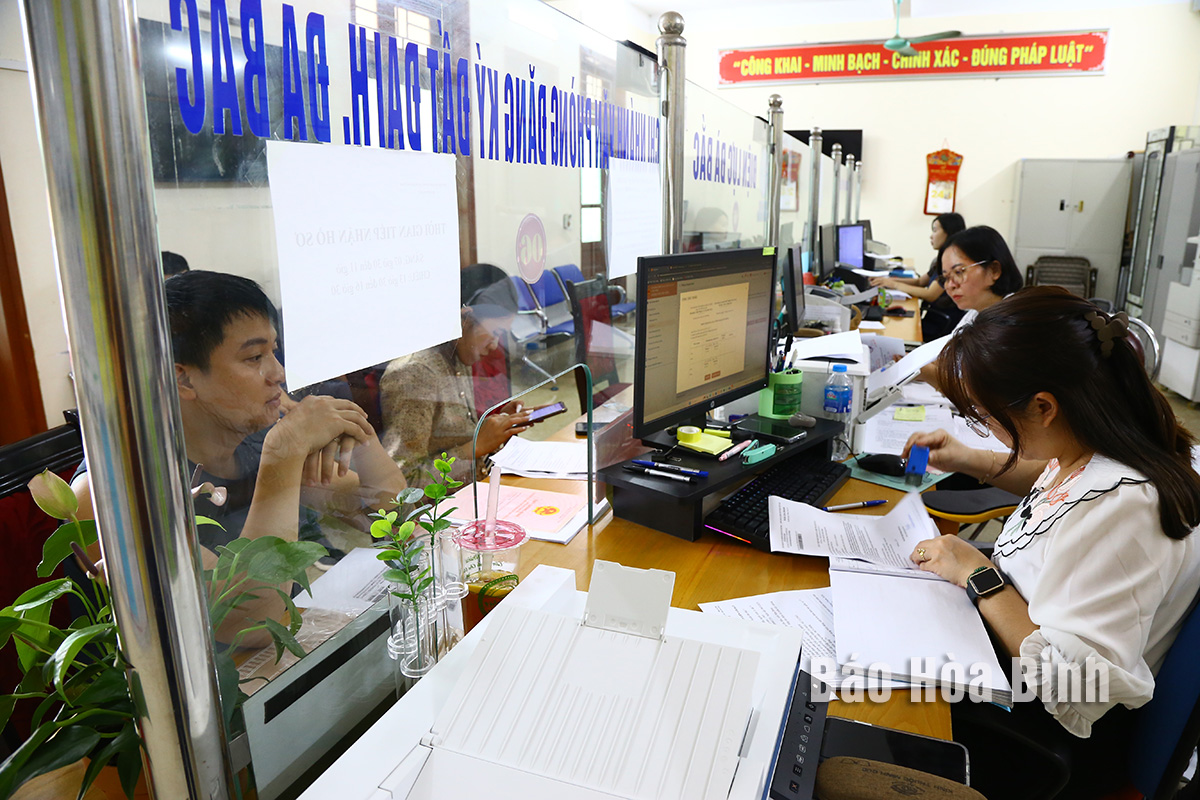
As a mountainous district still facing numerous challenges, Da Bac has made notable progress in advancing administrative reforms across various areas. The district has prioritised reorganising and streamlining its administrative apparatus, operating "one-stop-shop” units, and applying information technology (IT) in the handling of administrative procedures. Efforts have also been directed toward upgrading infrastructure and equipment to enhance service quality for residents and businesses.
The one-stop-shop division responsible for receiving and returning administrative procedure requests in Da Bac district has created favourable conditions for individuals and businesses seeking to complete administrative tasks.
Sa Thi Ngan, a resident of Da Bac township, shared her satisfaction after visiting the "one-stop-shop” unit to complete procedures for transferring land use rights. She praised the thorough guidance provided by the staff and the clear timelines for receiving results, which adhered to State regulations.
Luong Van Thi, Chairman of Da Bac district People’s Committee and head of the District Steering Committee for Administrative Reform, noted that since the beginning of the year, the district has issued directives on key administrative reform tasks. Administrative procedures, as well as channels for receiving feedback and complaints from individuals and organisations, have been made public on the district’s e-portal. Dossiers and outcomes are digitised in compliance with regulations.
Currently, all communes in the district have established modern "one-stop-shop” units to handle administrative procedures for residents and organisations. The application of IT in management, operations, and public services has contributed to administrative modernization and the development of a digital government in the locality.
As of now, all administrative procedure dossiers are processed online. In the first nine months of this year, a total of 13,438 applications for administrative procedures were received, including 536 at the district level and 12,902 at the commune level. The majority of these applications were resolved on time.
Despite these achievements, the district still faces challenges. The review and simplification of administrative procedures yielded limited results, and some agencies and units have not yet met established goals and standards. Additionally, the use of IT in management and operations has not been fully optimised.
To address these issues, the district plans to implement several solutions. According to Chairman Thi, communication efforts will be intensified to raise public awareness about the importance and impact of administrative reforms. Regular reviews and evaluations of administrative procedures will be conducted to propose timely updates and amendments. Greater emphasis will also be placed on IT applications to improve efficiency in handling administrative tasks and streamlining operations across agencies.
Furthermore, the district will strengthen oversight and monitoring to promptly address shortcomings, while recognizing and rewarding individuals and collectives for outstanding performance. Maintaining and improving the quality of "one-stop-shop” units at both district and commune levels will remain a top priority. Investments will continue in upgrading equipment to meet the standards set by the provincial Department of Information and Communications and align with the province’s roadmap for modernising administrative services.
Finally, the district will enhance inspections of public service activities and administrative reforms, with a focus on resolving bottlenecks and strictly addressing any negative behaviors or misconduct in the handling of administrative procedures.
In Hoa Binh province, 11 traditional craft villages with more than 400 small-scaled production households have put in place a clean and green production model, establishing new standards for sustainable development. Waste collection sites and wastewater treatment facilities have been meticulously managed by local residents.
To make it easier for the residents to handle administrative procedures, Yen Bong Commune (Lac Thuy District) has identified the administrative reform as one of its key tasks. By implementing a range of synchronized solutions, the commune has seen the positive changes in the administrative reform, meeting the needs of its people.
Mai Chau district has firmly established itself as a standout destination on Vietnam’s tourism map, attracting both domestic and international visitors with its breathtaking landscapes, rich ethnic culture, and warm hospitality. However, beyond its natural and cultural charm, a secure and well-managed tourism environment has added to Mai Chau’s appeal.
As Vietnam enters a new phase of economic and administrative reform in 2025, Hoa Binh province is stepping up its efforts to streamline governance, boost economic growth, and attract investment.
The Hoa Binh provincial People's Committee held its monthly meeting on March 26 to review the progress of key projects, assess budget revenue and public investment disbursement, provide feedback on draft documents for submission to the provincial Party Committee's Standing Board, and discuss other important matters related to the committee's governance activities.
Playing a key role in Hoa Binh province’s economic development, Luong Son district has been focusing on science and technology development, innovation, and digital transformation.



